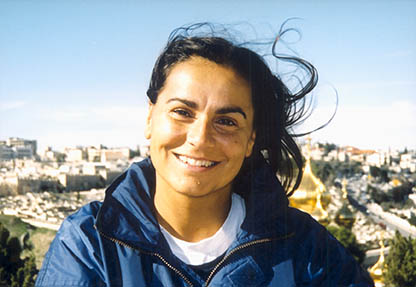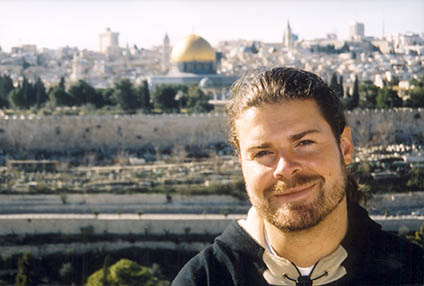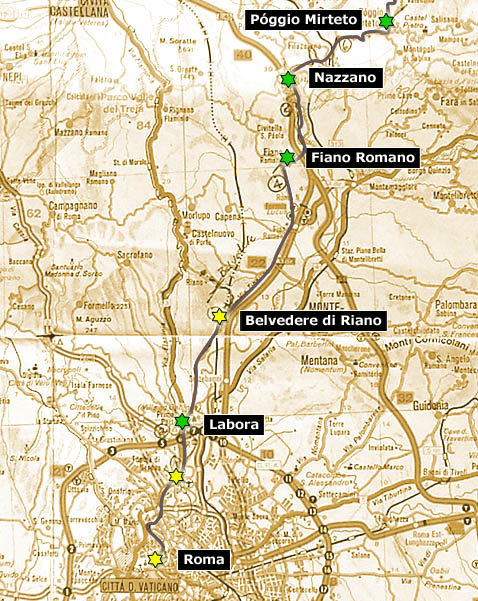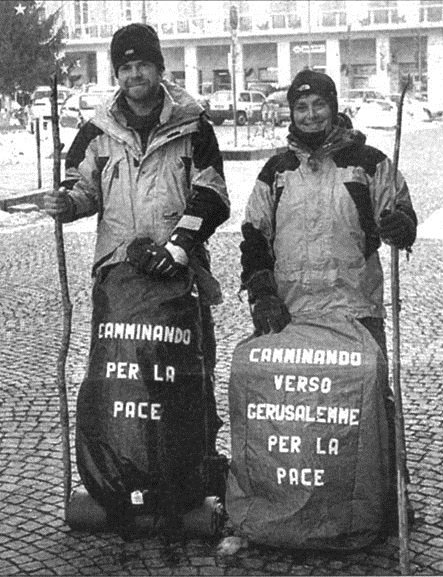Walking For Peace: One Couple's Incredible Journey
 In the life of each and every one of us, there is a defining moment, one after which we know that our lives will never be the same. For me, 9/11 was that moment.
In the life of each and every one of us, there is a defining moment, one after which we know that our lives will never be the same. For me, 9/11 was that moment.
I had by that time embarked in earnest on a search for self, leaving behind a lucrative marketing career, and committed to creating a life with meaning, one that went beyond material and professional success. Longing to trust my intuition over my logic, I followed what I believed were omens to Egypt. I meditated in many mosques and, one night, atop the Great Pyramid of Giza. I sat in the desert, and tried to listen to its whispers. I sensed a familiarity there that went beyond words, as if I had come home, and that this would be the place to nourish the next steps of my path. Those steps would inextricably lead me to the Path of St. James (also known as the Camino), an 800-kilometre pilgrimage path in northern Spain.
The Camino would change the course of my life. With nothing else to do but walk, my gaze naturally turned inwards. I begged the Camino for clarity, to show me my life purpose. To receive, however, I learned that I needed to let go. I needed to trust and allow myself to be guided. I needed to face my deepest fears and heal my deepest wounds. As experience after experience allowed me to do this, I was finally offered the gift I so longed for: Peace. I had no idea what that meant but my heart recognized its truth immediately. I resolved to understand what peace meant to me and to live it.
I already had the knowledge that to create peace in the world, I had to begin by creating it within myself. With 9/11, I would now put those ideas to the test, through action. A series of omens and encounters led me to decide that I would walk from Rome to Jerusalem, along a path more mystical than physical called the Way of the Soul…for peace. The idea resonated deeply within me, and I was so excited that I even imagined myself arriving to Jerusalem with a multitude of people from all faiths and religions, all walking together in one large peace march. I then pictured myself living in Jerusalem and working for some NGO dedicated to peace. I could think of no grander vision for my life.
I immediately began to search the Internet for ancient walking paths to Jerusalem, but I could not find them. I did find a Dutch woman who had walked from her home in The Netherlands to Jerusalem, but taking a different route than the one I was considering. I contacted her. She enthusiastically supported my quest and understood this call that was propelling me to walk. “Trust in yourself,” she advised. “Trust in the forces that have led you here. They will protect you and guide you.” In the darkest moments of my long journey, her words would become my mantra.
My intention was to walk alone, but Destiny had other plans. On my way  to Rome to begin walking, I crossed paths with a Spanish pilgrim I had met for one day in Finisterre, a town at the end of the Camino, a town whose name literally means the end of the world. Alberto was an artist and a mystic who shared my ideals about peace; and after receiving his own series of omens, felt that he too needed to walk this path of peace. I wasn’t sure how I felt about having company. We barely knew each other. We did not speak each other’s languages. More importantly, however, I wasn’t sure I wanted to share my way. This was my walk, and I wanted to do it my way, unencumbered by the needs or opinions of another.
to Rome to begin walking, I crossed paths with a Spanish pilgrim I had met for one day in Finisterre, a town at the end of the Camino, a town whose name literally means the end of the world. Alberto was an artist and a mystic who shared my ideals about peace; and after receiving his own series of omens, felt that he too needed to walk this path of peace. I wasn’t sure how I felt about having company. We barely knew each other. We did not speak each other’s languages. More importantly, however, I wasn’t sure I wanted to share my way. This was my walk, and I wanted to do it my way, unencumbered by the needs or opinions of another.
But I couldn’t ignore the manner in which we were thrust together; so while he prepared for the journey, I went ahead to Rome and began to walk alone, agreeing to meet two weeks later.
I bought the essentials I thought I would need for walking in winter, including a tent and camping supplies in case I couldn’t find hostels. My backpack weighed almost eighteen kilograms without food or water, and I worried about how my body would respond to that weight, especially since I would be walking on roads and not on trails. But I was determined.
On November 21, 2001, I took the first steps of what would be a five-thousand kilometre walk that would lead me through thirteen countries and require thirteen months to bring me to Jerusalem.
My only plan was to walk northwards towards the Adriatic Sea, passing Venice and then heading south along the other side of the Adriatic through the former Yugoslavia. From there, I imagined walking east through Albania, Macedonia, Greece and Turkey before heading south once again through Syria and Lebanon into Israel. Beyond that, however, I had no concrete plans. In the true style of pilgrims, I would go day by day, trusting that whatever I needed would be provided for along this Way of Peace.
I walked slowly, feeling the weight of my backpack straining my knees and ankles. I adjusted my backpack endlessly, trying to find a comfortable position. I sang to distract myself from the pain; but all to no avail. I think I stopped and rested more than I walked that day. When the sidewalk ended, I was forced to walk on the fast, open road, facing traffic. There was little space separating me from the ditch. People honked and angrily gestured for me to get off the road. It wasn’t the reaction I was expecting. It was at this point that I began to question the sanity of my decision.
“I’m crazy,” I told myself, completely forgetting my inspiration for walking. “I’m a danger not only to myself but to all drivers. I don’t even want to consider what they’re thinking about me, especially those men that drive just a little too slowly alongside me. I’m a woman with a backpack walking alone along the side of the open road, and easy prey. If I disappeared, no one would know about it. What in the world am I doing?”
I began to feel disheartened, and to think that perhaps this plan was terribly misconceived, ambitious, and worse yet, childish. Even If I were to arrive to Jerusalem, which I now seriously doubted, would it be worth all this risk and effort?
During one of my breaks, sitting on a bench just off the road, two older gentlemen sitting nearby greeted me and asked where I was going. In a mix of English, French and a lot of sign language, I managed to convey what I was doing. They both stood, for a moment dumb-founded, their mouths agape, gazing at me. Tears welled up in their eyes. This immediately brought out mine. Taking my hands in theirs, their voices filled with emotion, they made me understand that they were Albanian immigrants who had fled the civil war in their country.
“La pace è importante”, [Peace is important] they insisted, clasping my hands, the sincerity and emotion of their words the salve that my insecurities needed at that moment. I thanked them over and again, the word Grazie tumbling out of me. With a bottle of water as a parting gift, they sent me back on my way.
I floated away, light as a feather, buoyed by our encounter, and filled once again with the enthusiasm that launched this walk. These two men, my angels, had given me the emotional sustenance I couldn’t yet give myself. Remembering to always look within for all my needs would be the hallmark of my inner journey.
I spent my first night camping, wanting to challenge my deepest fears, and not allow them to fester and manifest as they pleased. There were no other campers that night. When the next morning I awoke to find the campsite being boarded up for the season, I knew beyond the shadow of a doubt that I was not walking alone, and that an Invisible Hand, call it Love, was indeed with me, facilitating the way.
I walked alone for only eleven days, but those days gave me confidence and the knowledge that I could walk all the way to Jerusalem alone if I had to. I now felt prepared to share my way with Alberto.
 I quickly learned that language was not our only barrier. Alberto had fewer economic means than I, and could not afford to stay in hostels as I had been doing. He reminded me that we were pilgrims, and as such, could call on the Catholic Church and monasteries for help in finding a roof over our heads; not necessarily a bed or even running water, simply refuge from the cold. I wasn’t thrilled at the idea of asking for help when I didn’t need it, or sleeping on some cold floor, but if I was going to share this way with Alberto, it was becoming clear that I needed to make some concessions. What I was unprepared to admit, however, was that I did not know how to receive graciously and openly, and preferred to be always giving (and therefore, in control) than to be in someone’s debt.
I quickly learned that language was not our only barrier. Alberto had fewer economic means than I, and could not afford to stay in hostels as I had been doing. He reminded me that we were pilgrims, and as such, could call on the Catholic Church and monasteries for help in finding a roof over our heads; not necessarily a bed or even running water, simply refuge from the cold. I wasn’t thrilled at the idea of asking for help when I didn’t need it, or sleeping on some cold floor, but if I was going to share this way with Alberto, it was becoming clear that I needed to make some concessions. What I was unprepared to admit, however, was that I did not know how to receive graciously and openly, and preferred to be always giving (and therefore, in control) than to be in someone’s debt.
Our walking on the open road attracted a great deal of attention, and more  so when we decided to carry large signs on our backpacks stating in Italian that we were walking to Jerusalem for peace. People stopped us on the side of the road to offer a handshake, a hug or a word of encouragement. They honked their horns in support, rather than in mere annoyance. Some even invited us to a drink or a meal, and sometimes to sleep in their homes, wanting to understand our intentions. We would repeat over and again the words that to change the world, you must begin by changing yourself. Those words were usually met with curiosity and interest, very rarely with derision, and quite often with amusement at the two “hippies” that were walking along the side of the road speaking about creating world peace through inner peace. Their generosity and kindness, however, was universal, with some people even offering us money to help us on our way. And this did not only occur in Italy, but in every one of the thirteen countries in which we would walk.
so when we decided to carry large signs on our backpacks stating in Italian that we were walking to Jerusalem for peace. People stopped us on the side of the road to offer a handshake, a hug or a word of encouragement. They honked their horns in support, rather than in mere annoyance. Some even invited us to a drink or a meal, and sometimes to sleep in their homes, wanting to understand our intentions. We would repeat over and again the words that to change the world, you must begin by changing yourself. Those words were usually met with curiosity and interest, very rarely with derision, and quite often with amusement at the two “hippies” that were walking along the side of the road speaking about creating world peace through inner peace. Their generosity and kindness, however, was universal, with some people even offering us money to help us on our way. And this did not only occur in Italy, but in every one of the thirteen countries in which we would walk.
That is not to say that the walk was always easy, and that every single person we met embraced us and our ideas. We experienced situations where people lived in a great deal of fear, fear that made them act callously. Their rejection was difficult to accept at first, especially when we wanted everyone to support this noble quest of walking for peace. We needed to learn to release our expectations and judgments of people, and to allow them to walk their path while we continued on ours. We came to look at rejections as opportunities to heal our deepest prejudices.
Perhaps the greatest teaching of this walk was something that my heart had declared long ago, but which my mind had refused to accept. The world is not a terrible place. People are not “bad” by nature. We all harbor the same universal hopes and dreams. And when you are living from the heart, in service to Love, the entire Universe moves to help you achieve your dreams.
I needed ten years to properly digest all that occurred during those thirteen months of walking. Although I was declaring over and again that peace begins within, only with time would I fully comprehend the power and profundity of those words. I would come to understand that we are all on a journey of self-discovery and self-mastery. There are many who walk this path consciously, others still not. My Walk for Peace began as an active response to a situation that I saw; but the true path I was walking in reality had little to do with peace in Jerusalem. It was a path of initiation, a journey into the inner realms, one whose intention was to heal the wounds and divisions that I hosted there, so that the Light that is our essence may fully manifest and declare its presence in its rightful home: the heart.
The Jerusalem I was walking towards was always within me; a state of grace, perfection and peace that I know one day will be reflected in the Jerusalem that I see in my outer world.
Mony Dojeiji is a pilgrim, seeker and co-author of “Walking for Peace, an inner journey”, the true story of her and her husband’s 5000-kilometre pilgrimage for peace. You can read a recent interview with them here. For more information, please visit their site http://walkingforpeace.com
SHARE YOUR REFLECTION
4 Past Reflections


On Jul 23, 2012 Prachi wrote:
Thank you for this (and all the other) inspiring news stories. I love sister Mony's reflection on the path, "I did not know how to receive graciously and openly" and "We needed to learn to release our expectations and judgments of people, and to allow them to walk their path while we continued on ours. We came to look at rejections as opportunities to heal our deepest prejudices." These remain very humbling in bolstering our abilities to see the world as it is, and accept ourselves and others' gifts--even if they might not appear as such--with openness and gratitude.
1 reply: Gretchen | Post Your Reply

On Jul 23, 2012 Amy wrote:
Amen, Mony!
"When you live from the heart, in the service of Love, the entire universe moves to help you achieve your dreams." Thank you for this teaching Mony! Love, facilitating and guiding . . . leads us to PEACE and much more.
1 reply: Kristin | Post Your Reply

On Jul 22, 2012 DenisKhan wrote:
Warming this world
by our flaming hearts is better than to live in cold and windy world with stone
hearts –Juanita Rimkute
2 replies: Becky, Gretchen | Post Your Reply

On Jul 24, 2012 Innatebliss99 wrote:
In admiration and congratulations for your having evoked by your journey the sublime inner courage, honesty, trust/surrender, and fortitude which perhaps exists in all our hearts, but which not all of us have yet have sufficiently matured to brave the journey!
Post Your Reply